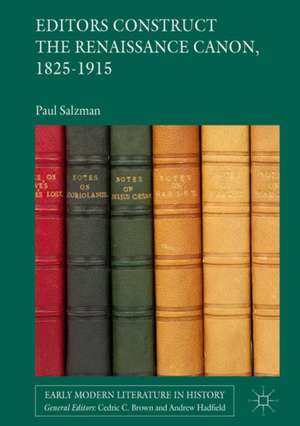Editors Construct the Renaissance Canon, 1825-1915: Early Modern Literature in History
Autor Paul Salzmanen Limba Engleză Hardback – 18 mai 2018
| Toate formatele și edițiile | Preț | Express |
|---|---|---|
| Paperback (1) | 576.89 lei 6-8 săpt. | |
| Springer International Publishing – 26 dec 2018 | 576.89 lei 6-8 săpt. | |
| Hardback (1) | 638.57 lei 6-8 săpt. | |
| Springer International Publishing – 18 mai 2018 | 638.57 lei 6-8 săpt. |
Din seria Early Modern Literature in History
-
 Preț: 395.47 lei
Preț: 395.47 lei - 20%
 Preț: 566.76 lei
Preț: 566.76 lei -
 Preț: 358.81 lei
Preț: 358.81 lei - 15%
 Preț: 704.17 lei
Preț: 704.17 lei -
 Preț: 408.92 lei
Preț: 408.92 lei -
 Preț: 387.75 lei
Preț: 387.75 lei -
 Preț: 392.60 lei
Preț: 392.60 lei -
 Preț: 389.70 lei
Preț: 389.70 lei -
 Preț: 390.25 lei
Preț: 390.25 lei -
 Preț: 387.20 lei
Preț: 387.20 lei -
 Preț: 390.63 lei
Preț: 390.63 lei -
 Preț: 390.63 lei
Preț: 390.63 lei - 15%
 Preț: 705.51 lei
Preț: 705.51 lei -
 Preț: 389.70 lei
Preț: 389.70 lei - 15%
 Preț: 639.41 lei
Preț: 639.41 lei - 18%
 Preț: 939.94 lei
Preț: 939.94 lei -
 Preț: 388.72 lei
Preț: 388.72 lei -
 Preț: 387.20 lei
Preț: 387.20 lei -
 Preț: 386.61 lei
Preț: 386.61 lei -
 Preț: 388.90 lei
Preț: 388.90 lei - 15%
 Preț: 702.54 lei
Preț: 702.54 lei -
 Preț: 389.11 lei
Preț: 389.11 lei - 15%
 Preț: 642.51 lei
Preț: 642.51 lei - 15%
 Preț: 640.06 lei
Preț: 640.06 lei - 15%
 Preț: 638.43 lei
Preț: 638.43 lei - 15%
 Preț: 698.94 lei
Preț: 698.94 lei -
 Preț: 386.39 lei
Preț: 386.39 lei - 15%
 Preț: 639.08 lei
Preț: 639.08 lei -
 Preț: 384.86 lei
Preț: 384.86 lei -
 Preț: 388.90 lei
Preț: 388.90 lei -
 Preț: 391.61 lei
Preț: 391.61 lei - 15%
 Preț: 643.00 lei
Preț: 643.00 lei -
 Preț: 391.61 lei
Preț: 391.61 lei -
 Preț: 387.75 lei
Preț: 387.75 lei -
 Preț: 389.70 lei
Preț: 389.70 lei -
 Preț: 390.63 lei
Preț: 390.63 lei - 15%
 Preț: 634.49 lei
Preț: 634.49 lei -
 Preț: 386.81 lei
Preț: 386.81 lei -
 Preț: 390.63 lei
Preț: 390.63 lei - 15%
 Preț: 641.85 lei
Preț: 641.85 lei -
 Preț: 388.72 lei
Preț: 388.72 lei - 15%
 Preț: 638.76 lei
Preț: 638.76 lei -
 Preț: 388.72 lei
Preț: 388.72 lei -
 Preț: 387.75 lei
Preț: 387.75 lei - 18%
 Preț: 728.11 lei
Preț: 728.11 lei - 15%
 Preț: 643.84 lei
Preț: 643.84 lei -
 Preț: 389.11 lei
Preț: 389.11 lei -
 Preț: 389.49 lei
Preț: 389.49 lei
Preț: 638.57 lei
Preț vechi: 751.25 lei
-15% Nou
Puncte Express: 958
Preț estimativ în valută:
122.25€ • 125.79$ • 103.05£
122.25€ • 125.79$ • 103.05£
Carte tipărită la comandă
Livrare economică 01-15 martie
Preluare comenzi: 021 569.72.76
Specificații
ISBN-13: 9783319779010
ISBN-10: 331977901X
Pagini: 163
Ilustrații: IX, 167 p. 10 illus.
Dimensiuni: 148 x 210 mm
Greutate: 0.37 kg
Ediția:1st ed. 2018
Editura: Springer International Publishing
Colecția Palgrave Macmillan
Seria Early Modern Literature in History
Locul publicării:Cham, Switzerland
ISBN-10: 331977901X
Pagini: 163
Ilustrații: IX, 167 p. 10 illus.
Dimensiuni: 148 x 210 mm
Greutate: 0.37 kg
Ediția:1st ed. 2018
Editura: Springer International Publishing
Colecția Palgrave Macmillan
Seria Early Modern Literature in History
Locul publicării:Cham, Switzerland
Cuprins
1. Introduction: Redeeming the Editorial Tradition.- 2. Alexander Dyce.- 3. Constructing a Perfected Shakespeare Text.- 4. Amateurs, Professionals, and the Second Half of the Century.- 5. Scientific Professionals and Learned Amateurs.- 6. Conclusion: Forgetting the Past.
Recenzii
“Salzman offers a balanced tour through a century of editorial practices. His synthesis of this history is poised to inform and extend our contemporary understanding of past and current approaches to early modern texts, bringing new comparisons to light and connecting them with elements of known history. … this volume invites the interested expert or new reader to consider current approaches as part of a long history that informs contemporary criticism and reading.” (Jennifer E. Nicholson, Parergon, Vol. 39 (1), 2022)
“A well-researched and interesting piece of work certainly deserves our praise and thanks for its clear and carefully documented presentation of the years of Renaissance and Shakespeare editions here under scrutiny. In his invaluable historical approach, Salzman provides us with a well-needed context making for a better understanding of the importance of the work of those nineteenth and early twentieth-century editors of Renaissance literature and culture to whom he is paying a justified tribute … .” (François Laroque, Cercles, cercles.com, December 15, 2019)
“This compact, useful study of nineteenth- and early twentieth-century editorial practice, is one of a few recent books that attempt to define the origins and describe the evolution of the canon upon which teaching and scholarship in the field of early modern literature are based.” (Jeremy Lopez, The Review of English Studies, September, 2018)
Notă biografică
Paul Salzman is Emeritus Professor at La Trobe University, Australia and Professor at Newcastle University, Australia. He has published widely on early modern literature. His recent work includes Literature and Politics in the 1620s: ‘Whisper’d Counsells’ (Palgrave), the essay collection Editing Early Modern Women (co-edited with Sarah C. E. Ross), and an online edition of Mary Wroth’s Love’s Victory (Early Modern Women’s Research Network).
Caracteristici
Fills a traditional gap in accounts of Renaissance canon formation in the nineteenth century Features an account of Grosart that will prove a signal contribution to the discipline Sheds renewed light on 19th C editors of Renaissance literature such as Dyce, whose work has, in recently scholarly discourse, been largely overlooked
